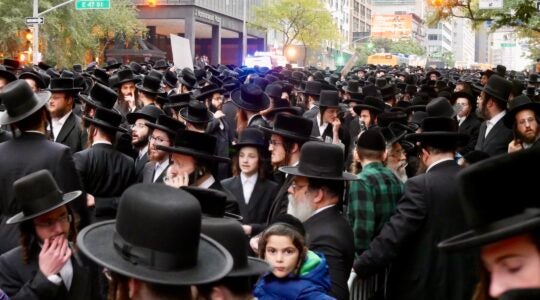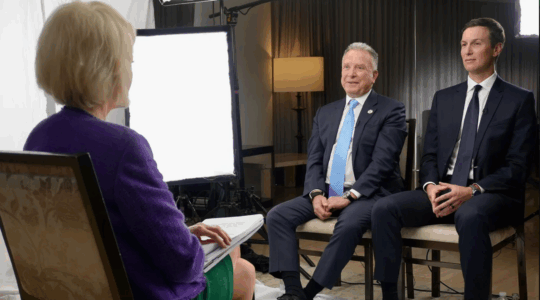WASHINGTON (JTA) – The federal judge in the classified information case against two former AIPAC staffers wants to probe prospective jurors about possible anti-Semitic views.
Judge T.S. Ellis III of the U.S. District Court in Alexandria, Va., also asked prosecutors and defense lawyers for opinions on banning peremptory challenges to prospective jurors that appear to be based on religion.
Ellis’ requests add two more potentially groundbreaking legal wrinkles in an already unprecedented case. And they signal that the trial will likely raise the specter of dual loyalty to Israel and the United States.
Steve Rosen, the former foreign policy chief of the American Israel Public Affairs Committee, and Keith Weissman, its former Iran analyst, were indicted under a never-used 1917 Espionage Act statute that criminalizes the receipt and dissemination of national defense information.
The indictment alleges that the two former lobbyists obtained such information on Iran and terrorism, and relayed it to journalists, colleagues, Israeli diplomats and other U.S. government officials.
Abbe Lowell, Rosen’s lawyer, was pleased by the announcements.
“In a case like this which concerns the pro-Israel lobby, defendants who are themselves Jewish, events in the Middle East [and] the times we live in, it’s very appropriate that the judge should be sensitive and ask us to be sensitive to a jury selection device that might minimize” the risks of selecting jurors with an anti-Jewish bias, he said.
Weissman’s attorney, Baruch Weiss, agreed.
“We’re incredibly grateful that the judge’s sense of fairness has pushed him to ensure that the jury is not tainted by anti-Semitism in a case involving disclosures by employees of AIPAC,” he said.
Both announcements, made during an otherwise routine scheduling portion of a hearing last week, surprised lawyers. Ellis previously had ruled out the kind of written jury questionnaire that could weed out prospective jurors with an anti-Jewish bias. And the U.S. Supreme Court has restricted peremptory challenges – the ancient procedure through which a lawyer can eliminate a juror without explaining why – only in cases when it is clear that such challenges are race or gender-based.
In a handful of U.S. cases, lower courts have extended those restrictions to religion or ethnicity-based challenges, but no such restrictions have ever been applied in the 4th Circuit, the appellate circuit that encompasses Ellis’ court. The lack of precedent prompted the judge’s requests for opinions on the matter.
Prosecution lawyers had no comment because the requests are a “pending matter.”
In his remarks at the Nov. 8 hearing, Ellis said the case led him to consider exceptions to standard practices because it resembled in some ways racially charged cases he had adjudicated.
“I view it as no different from cases in which I have the specter of race in it,” where there is some concern that prospective jurors may have “an animus that should not be operating,” he said. “And of course I am referring to anti-Semitism.”
The remarks came during a sealed hearing on how to deal with classified information. Toward the end, Ellis told the court transcriber to lift the classification status for the last part of the hearing because it did not pertain to the final matters he wanted to address.
No reporters were present, however, because the docket had listed the entire hearing as sealed. The transcript was not made available until late Wednesday, when it was obtained by JTA.
Ellis’ remarks came as lawyers discussed a date for the trial, which is now expected to take place in March or April.
“By the way, about 10 days before the trial date, I want you to meet and confer and submit to the court either an agreed-upon or separate juror questionnaire,” he announced.
That was a surprise; Ellis dislikes preset questionnaires, and is known to prefer his own back-and-forth with jurors.
“OK,” was all Lowell said in response.
Ellis elaborated that he would ask the jurors the questions, but he wanted the lawyers to come up with sophisticated phrasings.
He warned the lawyers that they could not ask “Are you an anti-Semite?” and “expect to get a straightforward answer.”
Such questionnaires are becoming commonplace, Lowell told JTA.
“In federal courts in America today, a written jury questionnaire is becoming the norm and not the exception,” he said Wednesday. “It’s a fabulous device because it gives you more info about what jurors really think and it takes less time in the actual courtroom.”
Ellis also raised his concerns about peremptory challenges.
The judge asked lawyers on both sides “whether there is a Batson charge for religion,” referring to the 1986 Supreme Court decision that banned such challenges when they are clearly race-based.
“That’s an important point,” Ellis said. “In other words, can the government strike someone just because his name ends in Stein or whatever, or can the defense strike somebody because his name is Mohammed?”
Defense lawyers also were pleased earlier in the hearing when Ellis ordered the government to remove the huge red classification notices on documents to be considered by the jury.
The government plans to use the documents to show that information relayed orally by U.S. government officials to Rosen and Weissman was classified. Ellis ruled that the government may indicate that the documents were classified, but not through the markings.
Looking at a mass of documents prominently stamped “Secret,” Ellis said, “creates, I think, unfair prejudice, likelihood of confusion with the jury, notwithstanding the instruction” to ignore such markings.
JTA has documented Jewish history in real-time for over a century. Keep our journalism strong by joining us in supporting independent, award-winning reporting.





